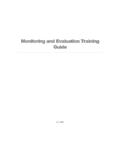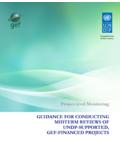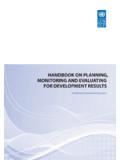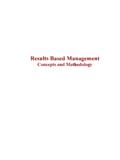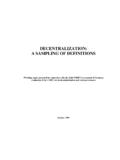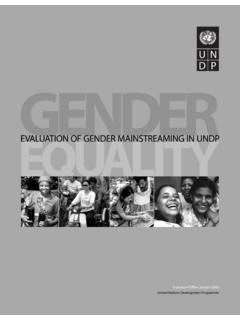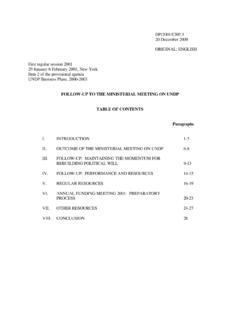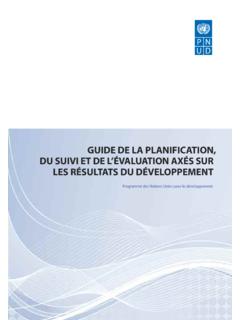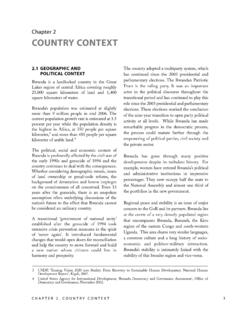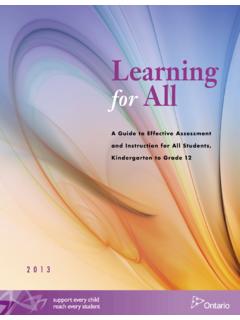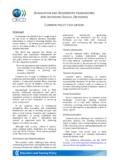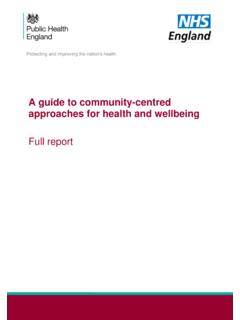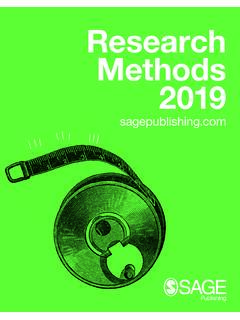Transcription of Handbook on Monitoring and Evaluating for Results
1 E VA L UATION OFFICE. Handbook on Monitoring and Evaluating for Results Handbook on Monitoring and Evaluating for Results UNITED NATIONS DEVELOPMENT PROGRAMME. evaluation OFFICE. evaluation Office 2002. evaluation Office United Nations Development Programme One United Nations Plaza New York, NY 10017, USA. Design: Colonial Communications Corp., New York, NY, USA. Foreword The growing demand for development effectiveness is largely based on the realization that producing good deliverables is not enough. Efficient or well-managed projects and outputs will lose their relevance if they yield no discernible improvement in development conditions and ultimately in peoples' lives.
2 The United Nations Development Programme is therefore increasing its focus on Results and how it can better contribute to them. To support this strategic shift toward Results , UNDP needs a strong and coherent Monitoring and evaluation framework that promotes learning and performance measurement. The framework must be simple and user-friendly enough for all staff project, programme and country office and headquarters to use it in flexible ways that ultimately enhance the development effectiveness of the organization as a whole. The Monitoring and evaluation framework contained in this Handbook is therefore guided by three equally important objectives: to align the Monitoring and evaluation system with Results -based management; to promote evaluative knowledge and learning around Results ; and to simplify policies and procedures.
3 Changes in the mind-set and approach of staff are called for by several elements of this framework, which places a premium on coherent and long-range planning around Results ; partnering for development change; capacity building for and ownership of Monitoring and evaluation ; and promoting knowledge, learning and the use of evaluative evidence. A certain amount of training will therefore be necessary. Although we fully expect to learn from the new framework and update it as it evolves, it is important to underscore that its introduction represents a key step forward for UNDP. The tools and policies described here are intended to promote the use of evaluative evidence so that lessons learned inform our management decisions and future programming decisions.
4 Furthermore, they are designed to help UNDP. and its partners in development meet the challenge of choosing the right Results , testing the accuracy of our development hypotheses and demonstrating how and why change happens where it matters most in improving the lives of the poor. Z phirin Diabr . Associate Administrator June 2002. H A N D BOOK ON Monitoring AND EVA L UATING FOR Results . i Preface Since 1999, UNDP has pursued a major programme of reform and renewal with a central objective: to demonstrate how and where the organization is making a measurable contribution to the elimination of poverty.
5 This effort depends on Results -based management (RBM), a methodology in which performance at the level of development goals and outcomes is systematically measured and improved, and resources are strategically managed and put to the best possible use to enhance the organization's development For UNDP, this shift to a culture of performance calls for all programming instruments including Monitoring and evaluation to be aligned with the RBM methodology. In the future, the success of UNDP will be measured by its contributions to the achievement of outcomes (the development changes that UNDP works towards through, among other things, its projects, programmes and partnerships).
6 It is more evident than ever that development effectiveness rests on strengthening institutions, improving policy frameworks and forging strategic partnerships. Monitoring and evaluation activities in UNDP are responding to the intensified focus on outcomes by shifting towards better measurement of performance and more systematic Monitoring and reporting; most importantly, such activities are fostering an organizational culture of learning, transparency and accountability. This publication, The Handbook on Monitoring and Evaluating for Results , addresses the Monitoring and evaluation of development Results .
7 It is intended to support country offices in aligning their Monitoring and evaluation systems with RBM. methodology specifically in tracking and measuring the performance of UNDP. interventions and strategies and their contributions to It aims to provide simple, flexible and forward-looking tools. 1. Throughout the publication,the terms Results -oriented and a Results -based approach are used in a general way to refer to the methodology of Results -based management.. 2. The Handbook specifically addresses the Monitoring and evaluation of development Results . It does not cover Monitoring of management , where Monitoring and evaluation actions at country level also concern management action, this is mentioned.
8 H A N D BOOK ON Monitoring AND EVA L UATING FOR Results . iii While its primary audience is country office staff, the Handbook also will be of interest to others within UNDP who use information gained through Monitoring and evaluation to report on Results , improve interventions and make programme and policy decisions. It also will be of use to staff concerned with policy change and reform. Outside of UNDP, it may be relevant to other United Nations agencies, governmental and non- governmental organizations (NGOs), members of the academic community and independent evaluators engaged by UNDP.
9 The publication is expected to contribute to the capacity for Results -oriented development within UNDP and its national partners. In addition to the printed version of this Handbook , the document is available in its entirety on the evaluation Office's website ( ). The website contains frequently asked questions (FAQ), references to other resources and training packages, and a periodic update and development of all Monitoring and evaluation methodologies within UNDP. This Handbook is the culmination of a comprehensive process of learning and consultation, and has benefited from the input of a number of individuals, each whom deserves special mention.
10 First, thanks go to the evaluation Office colleagues who helped to conceive, draft and refine the Handbook over its many iterations. Specific thanks go to Siv Tokle, the Task Manager for the M&E guidelines revision, who ably marshaled the process from its inception and helped draft the Handbook , and to Linda Maguire, who contributed to the drafting as well as helped to develop new outcome evaluation methodologies. The Handbook also benefited from the inputs of a Yellow Handbook Focal Point Group , comprising UNDP and UN agencies colleagues who provided substantive and technical input and feedback to the various drafts.
